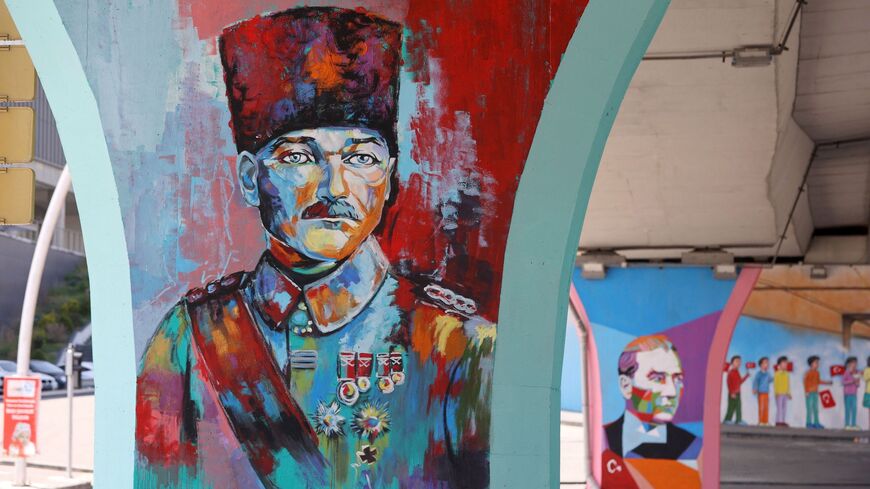Turks continue to vent their rage and cancel subscriptions by the thousands to Disney’s digital streaming platform, Disney+, after the entertainment giant decided not to air a highly anticipated series on the life of the founder of modern Turkey, Mustafa Kemal Ataturk. The hashtag #Disneyiptalet — Turkish for “cancel Disney” — was top trending Thursday for the third day in a row since news of the cancellation emerged. Disney is thought to have caved to pressure from the US-based Armenian lobby, which has been campaigning for the six-part show to be axed.
Armenians, Greeks and Kurds across the globe are furious that the period drama whitewashes as they see things the carnage Ataturk oversaw as he forged a new nation from the remains of the Ottoman Empire — and mainly at their expense. Turks are every bit as furious that their revered leader is being accused of such sins. A spokesman for Turkish President Recep Tayyip Erdogan’s Justice and Development Party (AKP) called Disney’s move “a disgrace.”
Turkey's state broadcasting watchdog, RTUK, announced Wednesday that it had launched a probe “based on the public information” that Disney+ had decided to pull the biopic. "Mustafa Kemal Ataturk, the founder of our Republic of [Turkey], is our most important social value," RTUK head Ebubekir Sahin said.
Last month, Disney+ Turkey announced it would be airing the series on Oct. 29 to coincide with the 100-year anniversary of the founding of the Republic.
The company has since scrambled to staunch the damage, saying it will air the show as a documentary on the Fox Channel television station in Turkey and as two separate films in movie theaters. The statement has had little impact, with Turkish celebrities and politicians — including members of the main opposition Republican People’s Party founded by Ataturk — leading the chorus of protest.
Many say that none of this should come as a surprise, as Disney should have known better than to venture into such a minefield.
“Turkey is an increasingly controversial country in Western politics. Disney is a US-based company. It was inevitable that a production about a great Turkish leader would spark controversy abroad,” said Selim Koru, editor of the KulturKampf newsletter and an analyst at The Economic and Research Foundation of Turkey, an Ankara-based think tank.
“Even if Disney ends up releasing its production, it’s probably going to run into domestic criticism. Turkish viewers are unlikely to be satisfied with an American production of so sensitive a topic,” Koru told Al-Monitor. “It’s really not rocket science. Disney should have known better.”
James Jeffrey, a former US ambassador to Turkey and head of the Wilson Center’s Middle East Program, agrees. “Ataturk for almost all Turks is still seen as a combination of George Washington and Thomas Jefferson — the Ottoman soldier who won the iconic Dardanelles campaign then later liberated the nascent Turkish Republic from Russian, French, Italian, Greek and British invaders,” Jeffrey said.
Numerous world leaders have hailed Ataturk for his statesmanship, among them Winston Churchill. “The tears which men and women of all classes shed upon his bier were a fitting tribute to the life work of a man at once the hero, the champion and the father of modern Turkey,” the former British prime minister wrote of his Turkish contemporary and erstwhile foe.
For most Turks young and old, if it had not been for Ataturk, there would be no Turkey. To show their gratitude, every Nov. 10 at 9:05 a.m. — the date and time marking Ataturk’s passing 85 years ago — millions of Turks across the country observe a minute of silence. Traffic halts and sirens blare to honor Ataturk’s memory.
“Ataturk Envy”?
The AKP and some of its supporters might have reacted differently a decade ago to Disney’s missteps.
Turkey’s Islamists have long reviled Ataturk as “an enemy of Islam,” a “drunk” and a crypto-Jew for abolishing the caliphate, forcing women to cast off their veils, introducing universal suffrage and switching the alphabet from Arabic to Latin, as he sought to set Turkey on a determinedly pro-Western and secular path. Their feelings were reflected by the late Necip Fazil Kisakurek, an Islamist nationalist poet and a virulent anti-Semite whom Erdogan famously described as his role model. Hugh Pope, a co-author of “Turkey Unveiled” who covered Turkey for many years, suggested in a recent essay for POLITICO that Erdogan suffers from “Ataturk envy.”
Thus it came as no surprise that when the AKP first came to power in 2002, the personality cult erected around Ataturk began to crack. Among these cracks was a burgeoning debate on the once-taboo subject of the Armenian genocide. Turkey denies that more than a million Ottoman Armenians died as a result of a deliberate policy to eradicate them as the empire collapsed. Rather, the official narrative goes, several hundred thousand of them died as a result of starvation and disease as they were forcibly relocated to the Syrian desert in the midst of war in 1915.
The wall of silence around the bloody suppression of Kurdish rebellions, the internment of Jews in labor camps in the 1940s and pogroms against Greeks began to crumble. Ataturk’s role came under scrutiny as Erdogan pushed through a dizzying raft of reforms aimed at securing Turkey’s membership in the European Union. Critics say Erdogan’s true aim was to defang the Turkish military and concentrate power in his own hands. He has largely succeeded. But Ataturk remains as strong as ever.
“The greatest compliment to his legacy is that President Erdogan, the most powerful Turkish leader since Ataturk and ideologically 180 degrees opposite, has had to tolerate and exploit the undying public adoration of 'Ataturk,' literally 'father of the Turks,'" Jeffrey observed.
Jeffrey was alluding to Erdogan’s selective appropriation of Kemalist ideology to justify his increasingly autocratic tilt but also to placate the military. Insulting Ataturk is a crime punishable by up to three years in prison. Fatih Tezcan, an Islamist journalist and diehard Erdogan fan, is among those behind bars for committing the offense.
A Mixed Legacy
Taner Akcam is the most prominent Turkish historian to assert that the Ottomans perpetrated genocide against Armenians, as is widely accepted by numerous governments, international bodies and academics worldwide.
Akcam asserts that Ataturk was directly responsible for successive massacres of Kurds, Alevis and Greeks in the early days of the Republic. Ataturk was not, however, involved in the Armenian genocide, Akcam contends.
“Not only did Mustafa Kemal [Ataturk] have no direct link to the genocide, he also made numerous comments condemning it,” Akcam told Al-Monitor. He labeled the Young Turks who masterminded the bloodletting “murderers” and argued that prosecuting them for their crimes was a political and legal necessity. In interviews that he gave to the Los Angeles Examiner in 1926 and 1927, Ataturk "openly decried the massacres inflicted on Christians during the war years,” Akcam said. Yet, he gave away Armenian properties to Young Turk families and prevented Ottoman Armenians and Greeks displaced by the war from returning to Turkey while “systematically expelling Armenians inside the country,” Akcam added.
Khatchig Mouradian, a professor at Columbia University who has written extensively on the genocide, said, “Ataturk may have not been a perpetrator of the genocide, but he set in motion a vision, policies and practices that consolidated its gains and are nurtured to this day.”
“A portrayal of Ataturk that ignores this legacy is no less brazen than embracing America’s founding fathers without contending with slavery and the genocide of Native Americans,” Mouradian told Al-Monitor.
“If a documentary would approach all these dimensions in a balanced way, it would of course be nice,” Akcam said.








